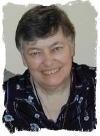
Sr. Hilda Frost OSB – "Reflections"
The Prologue is addressed to each one of us personally. It is an invitation to the beginner (and all of us) to follow Christ. Like any other invitation one is free to accept or decline. It is a matter of choice. If we decide to accept the challenge, it means a total commitment of our whole life to God. 'Is there anyone here who yearns for life and desires to see good days? If you hear this and your answer is 'I do' then God directs these words to you' (RB Prologue).
The very first word of the Prologue 'Listen' is probably the most important word in the whole Rule! The Latin word 'obsculta' implies a command. 'Do it, and do it now!' Benedict continues: 'Today if you hear God's voice, harden not your hearts' (Ps. 95).
He says we are to 'Listen with the ear of the heart'. This is no superfluous listening, but from the very depths of one's being. At the beginning of the spiritual journey each person is invited to a personal renewal: 'Return to God by the way of obedience'. So the whole idea of listening, and obedience go together.

Sr. Hilda Frost OSB – "Reflections"
The Prologue is addressed to each one of us personally. It is an invitation to the beginner (and all of us) to follow Christ. Like any other invitation one is free to accept or decline. It is a matter of choice. If we decide to accept the challenge, it means a total commitment of our whole life to God. 'Is there anyone here who yearns for life and desires to see good days? If you hear this and your answer is 'I do' then God directs these words to you' (RB Prologue).
The very first word of the Prologue 'Listen' is probably the most important word in the whole Rule! The Latin word 'obsculta' implies a command. 'Do it, and do it now!' Benedict continues: 'Today if you hear God's voice, harden not your hearts' (Ps. 95).
He says we are to 'Listen with the ear of the heart'. This is no superfluous listening, but from the very depths of one's being. At the beginning of the spiritual journey each person is invited to a personal renewal: 'Return to God by the way of obedience'. So the whole idea of listening, and obedience go together.
In the remainder of the Prologue Benedict spells out how we are to do this. Trusting prayer is always the first step…then we are to watch how we speak; we are to seek peace..renew our faith..and in all things live 'with the gospel as our guide'. From the very beginning Benedict always points to Christ. The Rule is entirely Christ-centred.
To anyone who responds to God's invitation Benedict offers these reassuring words: 'My eyes will be upon you and my ears will listen for your prayers; and even before you ask me, I will say to you: 'Here I am'…And he continues 'What is more delightful than this voice of the Lord inviting us. See how the Lord in his loving kindness shows us the way to life.'
Benedict refers to the monastery (or the home of the monastic person) as a 'School for the Lord's Service' in which there is to be 'nothing harsh, nothing burdensome'. That is the criteria throughout the whole Rule. Benedict's teaching is always leaning towards mercy, compassion, concern for the person. The humanness of Benedict which is apparent here at the beginning is reflected throughout the entire Rule. People are important! People matter!
At the very end of the Rule Benedict invites all of us to follow this 'Little Rule for Beginners' (RB 73). That was all he set out to do – to write a 'little Rule' that is within the reach of everyone. His teaching is as relevant today as it ever was. Our call as Benedict's disciples its pages gems of wisdom that will encourage us, sustain us in our struggles, give us joy and peace, and lead us day by day to a deeper union with Christ.
Listen to the words of John Main:
The genius of the Rule of St. Benedict is that it is written for weak human beings who bear within themselves all the faults, all the weaknesses of an enfleshed existence. The genius of St. Benedict is that taking very ordinary material, he puts it forward as a perfectly realizable aim….He ends the Prologue when he tells us that the final aim of the monk is seeking to serve the Lord with joy, to follow Christ with faith. (Community of Love. p 56)
Wishing all Oblates, Novices and friends a truly grace filled Advent and blessed Christmas.
With love to you all,
Hilda
Sr. Hilda is a Benedictine Sister at St. Benedict's Monastery, Winnipeg Canada. She comes from a very ecumenical background: with a Methodist father, a Congregationalist mother, who attended the Anglican Church in England. After attending a convent school Sr. Hilda became a Catholic, and entered the cloistered Benedictines in England. When the community became diminished and eventually had to close she came to Canada in l981. Sr. Hilda has a background in Scripture, monastic history etc. and has been a meditator for more than 20 years. She has given retreats and workshops on the Rule of Benedict, the mystics, as well as on Christian meditation. She is coordiantor of the WCCM Oblates in Canada, and also leads a meditation group in her own monastery.



